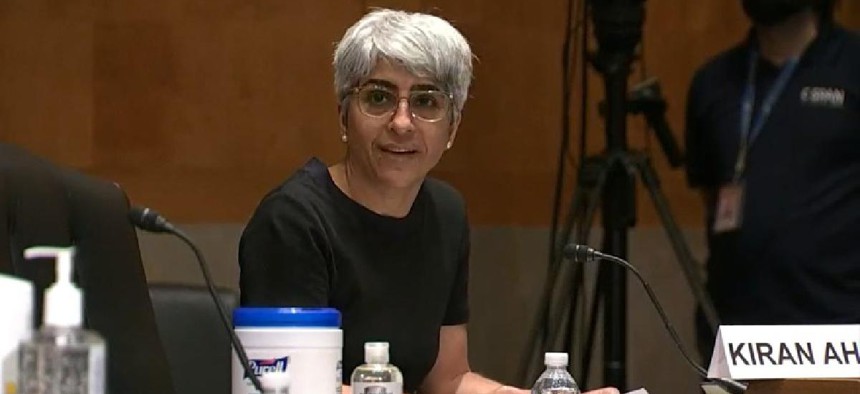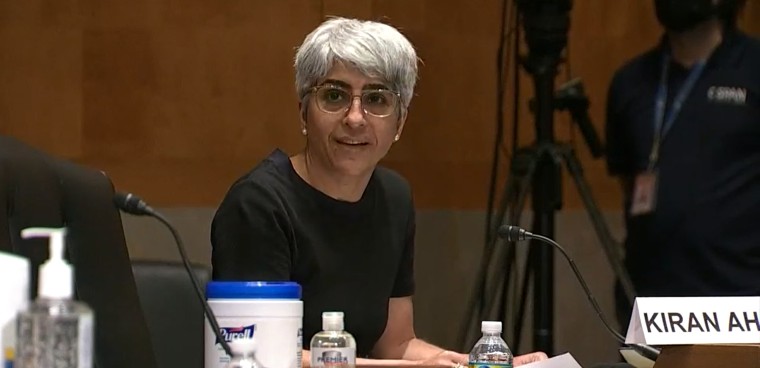OPM director talks federal recruitment with students

Kiran Ahuja talked about streamlining hiring, implementing President Biden's executive order on diversity and more at a George Mason University event.

Kiran Ahuja, now OPM director, at her Senate confirmation hearing on April 22, 2021
Kiran Ahuja, director of the Office of Personnel Management, pitched federal employment to college students and talked about the agency's work during an event at George Mason University on Monday.
The host of the event. Rep. Gerry Connolly (D-Va.), who heads a House subcommittee that conducts oversight of the federal workforce, framed the conversation against the backdrop of a potential retirement wave.
A third of the federal workforce is eligible for retirement, he said, and only 8% of the workforce is under the age of 30, as opposed to 28% in the private sector.
The federal government is looking at surging hiring during the Biden administration, Ahuja said. The Biden administration's fiscal year 2022 budget request asked for an increase of over 50,000 full-time equivalent civilian employees in the executive branch.
"This is actually the moment to come into the federal government. There is a lot of hiring going on," she said. "Our appeal to you all today, what we will be doing I think for months to come, is that the federal government is actually a great place and a very cool place to work."
The panelists, which also included Rep. Don Beyer (D-Va.), plugged the government's benefits package, pointing to the government's retirement Thrift Savings Plan and healthcare benefits.
Ahuja also touted the Public Service Loan Forgiveness Program, which offers loan forgiveness to public sector employees if they meet a certain number of on-time payments, are on certain repayment plans and have a specific type of loan.
"I wish I had that when I was at the Department of Justice…. It's a really amazing program," she said.
Beyer also heralded the program, saying that "it's the best retention tool we have."
That program, which debuted in 2007, is actually set to get a renovation from the Department of Education this week, according to reporting from NPR. It's long been subject to criticism for confusion over eligibility and mismanagement. The agency has been collecting public comments on the program since the summer.
OPM priorities
OPM is also working on is streamlining federal hiring, Ahuja said. For example, the agency issued regulations to ease the movement of former feds back into federal service. OPM has also been encouraging agencies to work together when recruiting for similar job openings.
"We're trying to basically encourage agencies to post those positions and use the same candidate list," she said. "Let's say that you get 200 individuals on a candidate list. You can all pick from that particular list."
When asked from a student in the audience about requirements for entry level federal jobs, Ahuja said that OPM is also looking at skills-based hiring.
"Right now we're reviewing a lot of occupations to move towards skills-based hiring and removing the college degree requirement," she said. "It's actually really relevant in the tech and cyber space because people aren't necessarily getting their degrees, they're learning on the job."
Ahuja also talked about her office's role in implementing Biden's executive order on diversity, equity, inclusion and accessibility in the federal workforce. One of the many deadlines for that order actually passed yesterday, when agencies' preliminary assessments of their own efforts were due.
At OPM, "we're taking a very data-driven approach to this effort. We're doing right now a baseline study across the federal government to see where we rank, what the numbers look like in each agency," she said. "And then we're doing kind of across the board how we're trying to update and improve and really promote best practices around HR policies and practices on every single level."
She also touched on telework, which OPM and the Biden administration have flagged as a long-term vision for the federal workforce post-pandemic.
"My plan and my view, of course in part ship with all of you on the Hill and across all the agencies, is to really lean in to telework," she said." There are actually right now some limitations in the law of how we might you know that we'll need to kind of work through to really make it more expansive."
Telework has seen resistance among Republican lawmakers, though, who have been calling for an end to maximum teleworking posture in the federal government.



